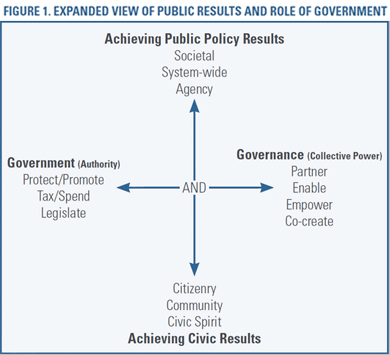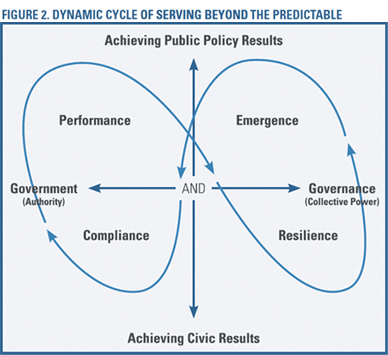Serving Beyond the Predictable
ETHOS Issue 07, Jan 2010

Even though the reforms they have undertaken since the 1980s are strikingly similar, public administrations vary from country to country, reflecting different histories, circumstances and philosophies on the role of government in society. Generally speaking, public administration lacks a unifying framework to help practitioners reconcile what was and integrate what is, as they forge what might be. Public organisations are not yet aligned with the complex issues they have to address1 or with the unpredictable nature of the global economy, networked society and fragile biosphere.2 This article outlines some potential directions for reform to help address this misalignment.
ACHIEVING PUBLIC RESULTS
To serve "beyond the predictable", public organisations must embrace a broader definition of public results, an expanded understanding of the role of government and a dynamic view of public administration. Their role is to achieve public policy results and civic results. To do this, public administrators must explore how to move results up the value-added chain and balance better policy results in the short term, with the need to engage citizens to achieve better results in the long term.

© J Bourgon 2009. Reproduced with permission.
SERVING BEYOND THE PREDICTABLE
The work of government extends beyond achieving public results in a relatively stable environment, to dealing with complex issues in a volatile environment.
The term "emergence" reflects the fact that new patterns arise from a vast array of interactions, and seemingly out of nowhere.3-5 Conventional government approaches were conceived to break down difficult undertakings into simpler tasks,6 not to deal with complexity and uncertainties. This linear approach leaves government in a reactive position, unable to detect emerging trends or intervene ahead of time.
Governments need alternatives. Complex problems cannot be solved by breaking them apart. They require a systemic or holistic approach.7 More knowledge does not resolve complex issues since problem definitions and the solutions are contested, and positions entrenched.8,9 Complex issues call for a participative approach to create a shared view of a given issue, opening up the possibility of concerted actions.10 Complex problems cannot be solved by replicating standardised actions of the past.9 New, emergent solutions must be grown to address them.
Governments acting alone cannot address an increasing number of complex policy issues ranging from public health and safety to environmental protection. These issues require active citizen participation and the contribution of multiple stakeholders.11 As governments start producing results with others, their options widen.12 Government can act as a partner, responsible contributor, facilitator or leader. Seen in this light, public administration is a dynamic system where the authority of the state is used in different ways to achieve different results.
Serving beyond the predictable renders traditional action antiquated and requires new capacities.
To achieve public results, the state apparatus must have strong institutional capacity. This ensures respect for the rule of law, checks and balances in the exercise of powers, accountability for the use of public funds, and respect for public sector values.
To achieve system-wide results, support government-wide priorities and work across borders, governments must have strong inter-organisational capacity.
Institutional and inter-organisational capacities give governments a solid foundation. To achieve results of high public value, we must take a fresh look at the administrative systems we have inherited.
IMPROVING THE CAPACITY FOR PUBLIC RESULTS
To achieve public results, the state apparatus must have strong institutional capacity. This ensures respect for the rule of law, checks and balances in the exercise of powers, accountability for the use of public funds, and respect for public sector values.
To achieve system-wide results, support government-wide priorities and work across borders, governments must have strong inter-organisational capacity.
Institutional and inter-organisational capacities give governments a solid foundation. To achieve results of high public value, we must take a fresh look at the administrative systems we have inherited.
Transforming Old Ways: Compliance and Performance
For instance, well-performing public organisations require strong control systems and effective performance management systems.
An effective control function is necessary to prevent corruption, ensure accountability for the exercise of delegated authority and the use of public funds, all of which are enforced through audit and compliance regimes. Control systems reduce the risk of mismanagement. Noncompliance must be verifiable and may lead to sanctions.
Performance management systems, on the other hand, are needed to achieve better results and improve decision-making at all levels. They help remove barriers to better results. The purpose of performance measurement and management systems is to accelerate the learning necessary for better results.
No system can be all things to all people. Over the last 25 years, the progressive integration of the two systems has impeded innovation in a number of countries. Negative effects include gaming of performance systems, excessive collection of data and general misuse of performance measurement information. A commitment to achieving public results provides an opportunity to reconsider the approach to date. Administrations can either eliminate the negative effects of an integrated regime or disentangle the control and performance management functions while still ensuring their mutual synergy.
Developing New Ways: Machinery of Government
A focus on system-wide results foreshadows the importance of modernising line departments, from vertical hierarchies to hubs of vast networks of organisations working to achieve common public results. In this context, the role of departments is to convene, facilitate and ensure a coordinated approach to improving the performance of the whole network—a role akin to that played by central agencies today. This means that vertical delegated authority and shared accountability for results must be reconciled.
Administrations must also modernise their concept of the role of the "centre of government". The most important role of central agencies is to ensure coherence in the inter-departmental and intergovernmental areas of modern governance.
Successful horizontal management requires easy access to decision makers, regular monitoring and reporting and the alignment of incentives, rewards and performance pay in support of the collective results. Central agencies have a special responsibility for ensuring that general accounting and reporting systems reflect today's reality, that an increasing level of departmental resources are used to achieve system-wide results and to support government-wide priorities.
~ Jocelyne Bourgon
Transforming Old Ways: Policy Units
Most governments have a strong internal policy capacity. Some have gained much experience in intelligence-gathering, scenario-planning or guiding public policy debates about strategic priorities. These are valuable assets for improving their anticipative capacity. The Netherlands, Singapore and the UK have much to share in this regard.
The challenge is not so much to gather more information or to build more powerful analytical tools (although more of both are needed); the challenge is to focus on extracting meaning and detecting probable patterns where none were seen before. Interpretation is key.
Developing New Ways: Explorative Capacity
Irrespective of efforts to improve anticipative capacity within government, the best knowledge about emerging patterns is in the minds of people, in the networks of inter-relationships in their community or in their global community of interests, and may lie beyond its grasp. In spite of a growing body of literature on collective intelligence,13,14 not enough is known about how governments can best extract knowledge and meaning on emerging patterns, how they can channel the efforts of many minds towards tackling complex public issues or how they can leverage the power of networks to connect actors, problems and solutions in new ways to achieve public results.
The challenge will be to integrate the findings of collective intelligence research and network theory into the intellectual framework of public administration, to help government anticipate, prevent and act to increase the likelihood of positive results.
BUILDING RESILIENCE
Where shocks can be reasonably foreseen, it is the role of government to anticipate, initiate pre-emptive action and mitigate key vulnerabilities.15,16

© J Bourgon 2009. Reproduced with permission.
However, where shocks cannot be foreseen or prevented, the role of government is to promote the resilience of society, ensure a more equitable distribution of risks and reduce the impact on its most vulnerable. This means building the adaptive capacity of society.17
Complex issues call for a participative approach to create a shared view of a given issue, opening up the possibility of concerted actions.
Individuals, organisations or government working alone cannot achieve resilience.16 It requires an active citizenry with the skills and confidence to act. It relies on strong communities with the capacity to mobilise resources and co-ordinate action that leads to common solutions.18
Changing Old Ways: Redundancy and Contingency
Redundancy refers to resources that can be deployed easily to explore emergent situations, experiment to enhance collective learning, and perform other functions to promote exploration, experimentation and innovation. Redundancy builds resilient organisations and improves their adaptive capacity.
Contingent capacity, a related concept, is the concept of building resources in areas of greatest vulnerability, allowing resources to be deployed rapidly in these areas. Public organisations that push aggressively for efficiency gains may erode their adaptive capacity.
Developing New Ways: Participative Approaches
A participative approach to public policy and policy implementation is not a luxury. It reinforces resilience and the adaptive capacity of society, particularly when it allows decision making and action at the community level.19
Where shocks cannot be foreseen or prevented, the role of government is to promote the resilience of society.
Complex issues can be large or small20 and governments must intervene appropriately to achieve the desired outcome.17,20 Small-scale interventions are a powerful way to gain insights on preferences, potential outcomes and unintended consequences, and micro interventions can accelerate collective learning, deflect risks and increase resilience.
CONCLUSION
Building on the strength of public institutions and organisations, governments are called upon to address complex issues in the unpredictable nature of the global economy, networked society and fragile biosphere. They are called upon to serve "beyond the predictable".
This role transforms the systems and structures that served us well in the past. It requires new capacities. Future public sector reforms entail improving the anticipative capacity of government and building the innovative and adaptive capacity of society.
As a result of a number of global failures and crises, a search for balance is under way to reconcile the private, public and civil society spheres. The need for a new balance reveals more clearly than ever the need for an affirmative state able to provide services of high public value, promote and defend the collective interest in all circumstances and also to serve beyond the predictable.
NOTES
- Bourgon, J. "Responsive, responsible and respected government: Towards a New Public Administration Theory." International Institute of Administrative Sciences 73 (2007): 7-26.
- Bourgon, J. "Performance Management: It's the results that count." The Asia Pacific Journal of Public Administration 30 (2008): 41-58.
- Bovaird, T. "Emergent Strategic Management and Planning Mechanisms in Complex Adaptive Systems." Public Management Review 10 (2008): 319-40.
- Holland, J.H. Emergence: From Chaos to Order (Reading, MA: Helix Books, 1998).
- Westley, F., et al. Getting to Maybe: How the World is Changed (Toronto: Random House, 2006)
- Wagenaar, H. "Governance, Complexity, and Democratic Participation: How Citizens and Public Officials Harness the Complexities of Neighborhood Decline." The American Review of Public Administration 37 (2007): 17-50.
- Senge, P. The Fifth Discipline: The Art and Practice of the Learning Organization (New York: Doubleday, 1990).
- Haveri, A. "Complexity in Local Government Change: Limits to Rational Reforming." Public Management Review 1 (2006): 31-46.
- Kahane, A. Solving Tough Problems: An Open Way of Talking, Listening and Creating New Realities. (San Francisco: Berrett-Koehler Publishers, 2004).
- Senge, P. Preface. In Solving Tough Problems: An Open Way of Talking, Listening and Creating New Realities, A. Kahane (San Francisco: Berrett-Koehler Publishers, 2004).
- Kettl, D. The Transformation of Governance: Public Administration for Twenty-First Century America (Baltimore: The Johns Hopkins University Press, 2002).
- Lenihan, D., et al. Progressive Governance for Canadians: What You Need to Know (Ottawa: Public Policy Forum, 2007).
- Surowiecki, J. The Wisdom of Crowds: Why The Many Are Smarter Than The Few And How Collective Wisdom Shapes Business, Economies, Societies, And Nations (New York: Doubleday, 2004).
- Tovey, M. Collective Intelligence: Creating a Prosperous World at Peace (Oakton, VA: Earth Intelligence Network, 2008).
- Berkes, F. "Understanding Uncertainty and Reducing Vulnerability: Lessons from Resilience Thinking." Natural Hazards 41 (2007): 283-95.
- McManus S., et al. Resilience Management: A Framework for assessing and improving the resilience of organizations. Resilient organizations research programme. University of Canterbury: Christchurch, New Zealand. Retrieved 2 January 2009 from http://www.resorgs.org.nz/ pubs.shtml.
- Berkes, F. and Folke, C. "Back to the Future: Ecosystem Dynamics and Local Knowledge." In Panarchy: Understanding Transformations in Human and Natural Systems, ed. L.H. Gunderson and C.S. Holling (Washington: Island Press, 2002): pp. 121-146 .
- Dale, A., and Onyx, J. A Dynamic Balance: Social Capital and Sustainable Community Development (Vancouver, BC: UBC Press, 2005).
- Lebel, L., et al. "Governance and the Capacity to Manage Resilience in Regional Social-Ecological Systems." Ecology and Society 11 (2006):19-37.
- Holling, C.S. "Understanding the complexity of economic, ecological, and social systems." Ecosystems 4 (2001):390–405.
FURTHER READING
- Habegger, B. Horizon Scanning in Government. Zurich: Centre for Security Studies. Retrieved 17 June 2009 from http:// se2.isn.ch/serviceengine/FileContent?serviceID=11&fileid= 3D89E3D1- 55A8-8622-F380-69C677A36478&lng=en
- Koppenjan, J. and Klijn, E-H. Managing Uncertainties in Networks: A Network Approach to Problem-Solving and Decision-Making (London: Routledge, 2004). • Mahbubani (2009). The Dangers of Democratic Delusions. Ethics and International Affairs, (1)23, 19-25.
- Salamon, L. The Tools of Government: A Guide to the New Governance (Oxford: Oxford University Press, 2002).

